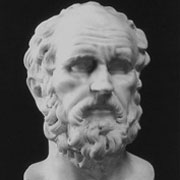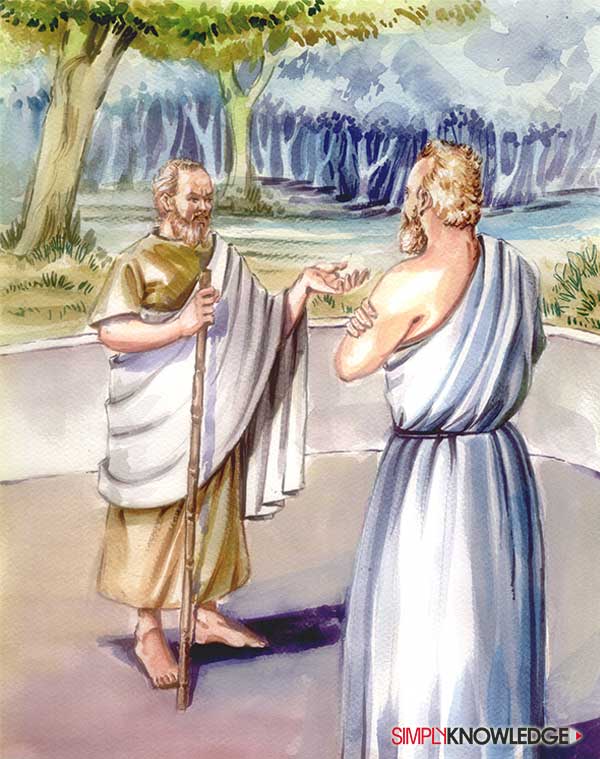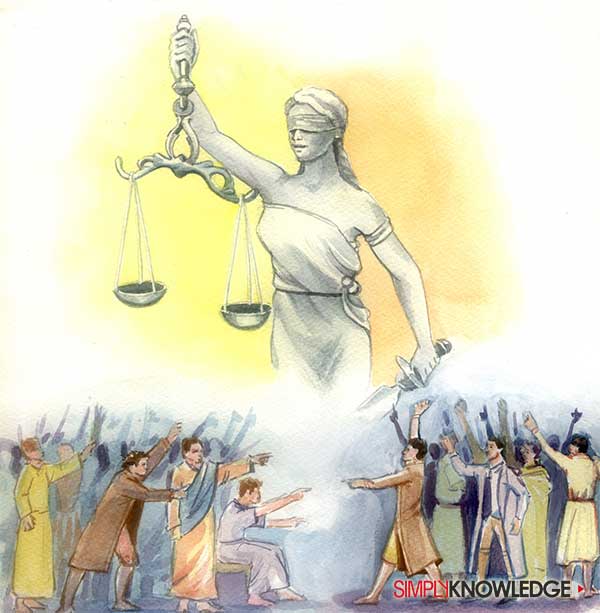


“Justice is simply the advantage of the stronger,” said Thrasymachus of Chalcedon in the fifth century BC. Interestingly, a similar observation was made almost 2,300 years later by the great scientist, Charles Darwin, who coined the phrase “survival of the fittest” in his theory of evolution.
History bears witness to that fact that Thrasymachus uttered the unspoken truth as early as the fifth century: the weaker, disadvantaged individual is oft the victim of injustice due to unjust and irrational laws, often penned by mighty rulers, regardless of whether they are autocratic, tyrannical or democratic. And Charles Darwin proved the fact later, albeit in a different manner. Surprisingly, Thrasymachus’ views which were considered archaic during his era are considered relevant today.

Information about Thrasymachus’ life is scarce. But works by ancient Greek thinkers including Plato, Aristotle, Hippias, Protagoras, Gorgias and Critias, among others, indicate he was born in or around 470BC. While his parentage is not known, the fact that Thrasymachus was an excellent speech writer, rhetorician and possibly could engage any thinker in a vivacious or litigious debate indicates, he was well educated- a characteristic peculiar to the rich and famous of the era.
Another established fact about Thrasymachus is, he was born in Chalcedon, now in Turkey. Whether Thrasymachus travelled to Athens for work or study remains unknown but records gleaned from the ancient Greek thinkers indicate, he was well respected in the Grecian capital around 425BC since his skills as a speech writer and rhetorician were in demand. Thrasymachus charged exorbitant fees for his works and hence, is often categorized as a Sophist- or thinkers who accepted fees for their teachings.

Thrasymachus is claimed to have lived opulently, since he enriched his coffers by charging plethoric fees. Due to absence of any clear records, historians are unable to ascertain when Thrasymachus passed away. However, it is widely accepted he died of natural causes since ancient chroniclers indulged in a bizarre habitude of authoring biographies of eminent personalities who died in preternatural circumstances such as suicide, execution or martyrdom on battlefield. The fact that Thrasymachus was not chronicled validates the belief that he died of old age and not from any anomalous contingency that merited a histrionic descriptive.
Modern historians suspect, Thrasymachus may not have evoked much interest among ancient biographers also because more sought after thinkers, including Socrates- who captivated the masses with his immanent eccentricity and esoteric teachings- existed concurrently. Thrasymachus and Socrates were friends, despite their doctrinal differences. Thrasymachus, it is claimed, died in 400BC- about a year before Socrates’ execution in 399BC.

With the two thinkers residing and teaching in Athens during the same era, a meeting between Thrasymachus and Socrates was imminent. Plato’s work, the ‘Republic’ mentions Thrasymachus meeting Socrates and contains the entire dialogue between the two prominent personalities about justice. What makes this meeting so special is modern day historians, psychologists, philosophy aficionados and myriad personalities continue to study and debate this specific meeting during which the two ancient greats sparred amicably while attempting to define the commonly used word- justice.
Plato, in his book the ‘Republic I’, narrates Thrasymachus verbally envisaging to Socrates, an archetypal tyrant who deploys every means- discreet or indiscreet, to rob others of their possessions, regardless of whether they are private or public properties and divine or carnal. He depicts this tyrannical ruler as seizing such possessions instantly or suddenly, due to the inherent power of his position. Thrasymachus next draws a corollary between the tyrant and other forms of government which enacts and enforces rules and laws that generally offer a buffer or immunity to rulers or, the ruling and wealthy class.
Since the elite are stronger in every aspect, the weaker are prone to punishments for violating any law, defenceless against forcible seizure of property and liable to lose their freedom through imprisonment, voluntary or forced slavery, Thrasymachus expounded in his dialogue with Socrates. Thracymachus concludes his presentation about justice to Socrates, drawing three main inferences: Justice offers inalienable advantage to the stronger and that justice demands adherence to laws stipulated by powerful rulers. And the third, most relevant inference: Justice merely serves the advantage of another entity- an intrinsically powerful individual, group, society or government.
The ‘Republic I’ further states that Socrates, using his distinctive ‘gadfly’ technique of questioning and responding to answers with a question, attempted to influence Thrasymachus alter his standpoint about justice. Thrasymachus, despite his discomfiture, countered Socrates effectively, despite several embarrassing moments and proved that his definition of justice was indeed valid.
Plato does not state whether Thrasymachus or Socrates accepts the other’s standpoint. Yet, the dialogue is a clear indicator that Thrasymachus’ definition of justice remains cogent to date.

Due to the insidious nature of Thrasymachus’ claims on justice, psychologists and legal experts continue to lock horns to date on his three statements. One group of legal experts and psychologists reason, Thrasymachus does not elaborate as to why any entity should follow legal regulations that are obviously unfair? They claim, Thrasymachus was a naturalist of sorts who believed in the ancient version of Darwin’s “survival of the fittest” theory. Hence, it is natural for the stronger to dominate the weaker, they aver.
A second group of experts debating Thrasymachus’ definition of justice however reject the “survival of the fittest” explanation. They propound that an individual or entity harmed in any manner by a person or the society, is exponentially “stronger” since they attract public sympathy. Hence, though the “weak” may have initially suffered injustice, the unjust act perpetrated against them has rendered them legally stronger- thus, they stand a better chance of getting justice.
Yet another school of thought states, Thrasymachus, through his definitions of justice, implied that fair laws can exist only in theory but never in practice, since the perception of what is “just” and “unjust” cannot be defined easily. In autocracies too, there are no “stronger” or “weaker” since laws are enacted to cover the maximum possible number of contingencies and suited demographically.
The debate, interestingly, takes newer dimensions with some other scholars claiming that Thrasymachus explicitly states the psychological fact that every human possesses an immanent dislike for laws, rules and regulations and are willing to flout them at every possible opportunity, especially when they believe they can escape prosecution by law enforcement authorities. Hence, there can never be justice in the world, they claim. Thrasymachus’ views are therefore nihilistic, they opine, while admitting they do provide impetus for lawmakers to ensure they plug all loopholes in existing laws to ensure they are fair to all- regardless of social or financial status.
Yet, these arguments do not aptly address Socrates’ question to Thrasymachus. Socrates had asked: “Can justice based on individual knowledge, virtue and reason exist?” This question posed to Thrasymachus, which had left him tongue tied about 2,500 years earlier, continues to perplex judicial experts and psychologists to date.
Biography of Thracymachus | 0 Comments >>
0 --Comments
Leave Comment.
Your email address will not be published. Required fields are marked.




